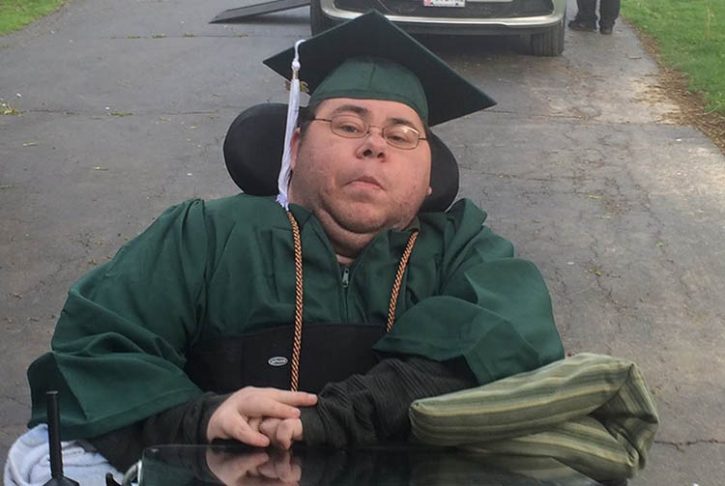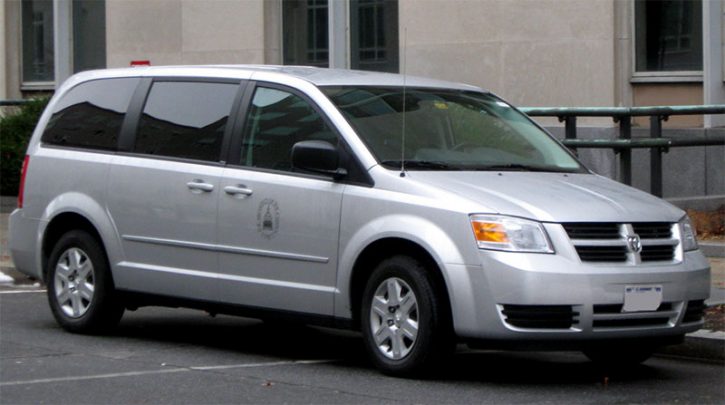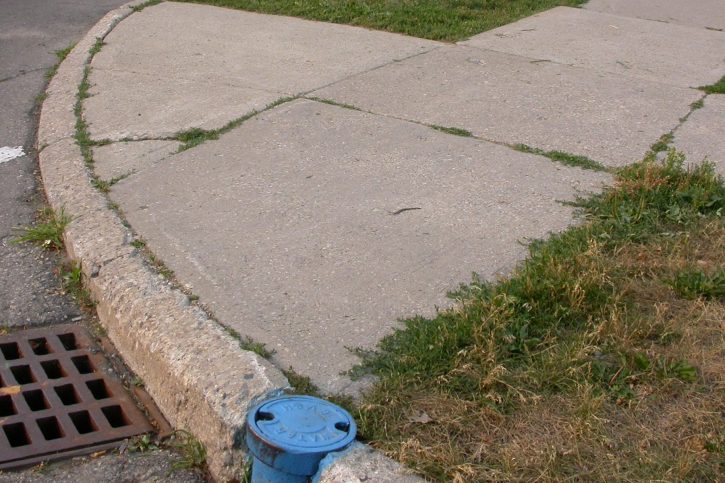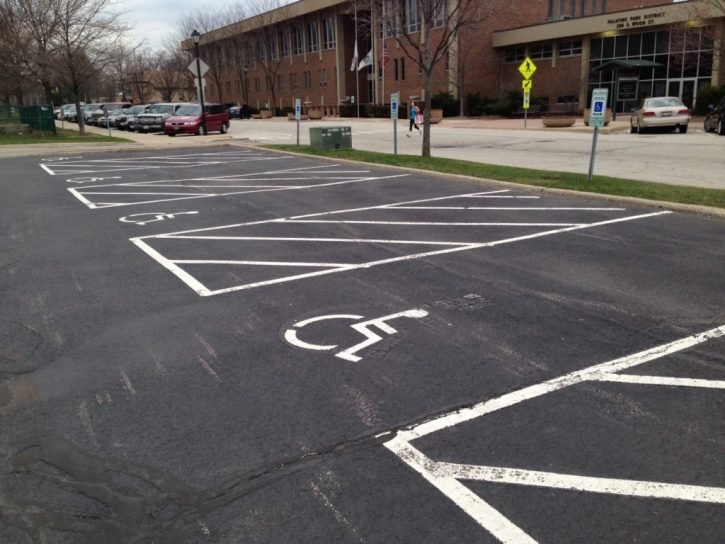I know that the initial title might seem a little controversial. First off, I definitely do not wish to invalidate anyone else’s experiences. I just would like to give you all a different way of thinking about disability. I hope that you’ll read this and really think about what I have to say.
That being said, I’m also not discounting disabilities that lead to hospitalization and illness. I spent a lot of time at the doctors, and at the hospital as a kid, with respiratory problems, which may have been a result of my neuromuscular disease, or may have been the result of asthma, which I also have. I have had pneumonia multiple times, and I know how scary that can be. However, beyond those instances that put us in the hospital or cause actual pain and/or suffering, I truly believe that what is more disabling, for most of us, are the following things.
I’m disabled…by societal attitudes
Truthfully, this is the biggest one, and all of the other things I am disabled by are accompanied by or are the result of societal attitudes. We have the view that we are missing something, we lack something, or we have lost something, by having a disability. This is why so many people say things like, “I’d rather be dead than have a disability.” Essentially, what those people are saying is that life with a disability is not worth living. What these people are missing is the idea that we as human beings can learn and adapt to nearly any situation. What is normal for those of us with a disability is not the same as what is normal for anyone else.
Societal attitudes are so deeply problematic, most people have zero idea their words, thoughts, or expressions towards people with disabilities, and disability, in general, can be discriminatory. They also have zero concept of ableism. They do not understand that widespread oppression exists with disabilities, and some even become combative when presented with information about the kinds of discrimination the disability community faces. These are the kind of attitudes that celebrate every time a parent posts a cochlear implant video where their child hears for the first time, and everyone celebrates the child “returning to normalcy” or when someone raises money for Autism Speaks because they want to “cure” autism. Instead, of celebrating people for their unique ability to communicate in different ways, we attempt to normalize everyone, by attempting to make them conform.
Society has a way of pitying people with disabilities, because people genuinely believe they should feel sorry for us. When I used to ride the bus regularly, people would tell me how good it was I left my home, how inspiring it was I got out of bed, and some would even thrust money into my hands, assuming I was less fortunate than they are. No one would believe I lived in a decent neighborhood, and I only took the bus because I couldn’t afford a $50,000 vehicle, the only kind of car those of us with disabilities can use for transportation outside of large urban areas. Don’t get me wrong, I don’t have very much money, but people who clearly were struggling more than my family was, were wasting their money on me, because society said that I was less fortunate than they were.
Whenever disability is celebrated, it is always because we are so inspiring for overcoming our “disability.” I don’t want to overcome my disability. There is nothing to overcome. I believe I am the person I am because of my disability. Many of us are not inspirations. We are just like everyone else, trying to live our lives, and some of us are even assholes. People with disabilities are as varied as the rest of society, and we would rather just be seen as any other person, as opposed to a beacon of hope and inspiration. I am not inspiring because someone got my butt out of bed, today, or because I decided I was out of groceries, so I went to the store. If you want me to be an inspiration, make sure it’s because I did something extraordinary, not because I was doing something mundane that everyone else on the planet does every day.
This is disabling because if society had more accepting attitude towards disability, those of us with disabilities would have more opportunities. If society believed those of us with disabilities had worth and potential, we would be encouraged to be successful contributing members of society. Most people with disabilities are highly educated, in spite of the fact that over 80% of our community is living in poverty. Societal views play a large part in this.
I’m disabled…by the cost of living with a disability
Having a disability is the most expensive thing. If you have a physical disability, like I do, you’ll need things like equipment. My wheelchair cost over $30K. My shower chair cost $5K. My van, the only thing I can ride in, cost around $60K. I spent over a decade saving up for it, and even then, I’m on a seven-year payment plan. During that decade, I was trapped in my county, unable to leave, and unable to go anywhere. I missed my grandmother’s funeral, because I couldn’t travel two hours south. When I moved for school, I had to rent a van, and it cost over $300 for one day of travel.
Being a person with a disability is insanely expensive. Some of us have to get tailor-made clothing, because traditional clothing won’t fit. Some of us have to pay for medication, therapy, and other health related costs. Finding a place to live can be hard. Many apartment buildings have steps. Most homes have steps. If you’re like me, you will have to add on or build a ramp. You may have to make your bathroom, bedroom, or kitchen accessible to your needs. Everything adds up.
At the same time, in order to keep your health insurance, you can only make so much money. So, if you want any of the things you need to survive, then, good luck, because your only hope is insurance. The cost of living with a disability, thanks to capitalism (vendors can charge as much as they want, even if it isn’t fair), is so extensive, the majority of people with physical disabilities live in poverty, simply to keep their health insurance or other benefits, such as PCA care (which would also cost quite a bit of money, out-of-pocket).
For many of us, it is a constant catch-22. We want jobs, and want to be successful, but if we make too much, then we don’t have the things we need to survive, to work, and to be independent. So we would lose our ability to work, without these items. There is also a huge gap between poverty and having insurance, and making enough money to cover the cost of living with a disability.
You want to know the funniest thing? It would cost taxpayers way more to put those of us with disabilities in a nursing home, which, would be one of the only solutions for those of us with severe disabilities if we lost our health insurance and our waiver services, which pay for care. A lot out of states would rather waste more money putting us in nursing homes, than to help us become more productive, contributing members of society, by ensuring we have the things we need to be independent.
Additionally, if we want any of these things, we have to fight the government, or insurance, or someone else to prove we need them. It can take months to get them. It would be impossible to live life with a severe physical disability, without being rich, if you have no insurance or other services.
This is disabling, because with the right support and services, many of us could work. We could be better contributors to society, because we would be paying more taxes. We would be spending more money. The disability community, in the United States, has the spending power of over $287 million per year, now. Imagine what it would be, if most of us had better paying jobs?
I’m disabled…by a lack of accessibility
The world is full of stairs, no curb cuts, steps, narrow hallways, and a lack of access to equipment. For me, it is the physical barriers that are disabling. For others, it may be the lack of access to communication devices, or something else, that may help make the world more accessible to them. This goes hand in hand with money, because if we had enough money, we could just pay to have barriers removed. We could pay to have elevators, or ramps, or hallways built. We could pay for all the equipment we need, to be functional.
This also goes hand-in-hand with bureaucracy, as it is up to government officials to make sure that much of our world is accessible. The Americans with Disabilities Act of 1990 set a precedent by requiring any buildings built after 1990 be made accessible, but that law doesn’t go far enough. For the past 25 years, businesses have been hiding behind the law, using the loophole that their building was built before 1990, to continue to keep people with disabilities out of their establishments. Often, the excuse is that they cannot afford to upgrade by conforming to ADA building standards. However, accessibility doesn’t just help people with disabilities. It can help older Americans, who might not be able to navigate steps anymore. It helps the parents with the baby stroller, and the assortment of equipment, who would struggle to climb the steps, while carrying their child, and said equipment.
Accessibility ensures that people with disabilities have the same opportunities as those without disabilities. We can explore the world, and it also allows us to be better consumers.
A lack of accessibility is disabling because it prevents people with disabilities from participating within their own communities. It keeps us from exploring the world we were born into. It prevents us from doing virtually anything…getting a home, going shopping, finding a job, or even taking a stroll throughout our communities. It limits our potential, and limits those around us by preventing them from interacting with us. The idea, “Out of sight, out of mind,” comes to mind. If people do not see people with disabilities within their communities, due to lack of accessibility, many of them don’t even realize we exist.
I’m disabled…by the perception of what disability is
People perceive disability in many ways, but most, if not all of those ways, are negative. People fear disability. They see it as something that is scary. I have lived with a disability my entire life, and even I was afraid of my own disability, for many years. Those who were around me contributed to making me afraid of becoming “too disabled.” You know, needing someone to do all of my activities of daily living, for me, and being unable to walk independently. Kind of like my life is now! I was afraid of it, because I didn’t understand, and now that I do I think I was ridiculous. I did not have anything to be afraid of, because I have found other ways to get what I need done, even if I can’t do it without help.
I think it says a lot about our society when people are so afraid to ask for help. I can’t tell you how many people I know with disabilities, who refuse to ask for help, because they are ashamed. This is because there is a negative perception associated with asking for help. Every human being needs help at some point in their lives. I embrace the fact that I need help, because it allows me to get the things I need done, each day. It allows me to be successful and independent, so why wouldn’t I embrace it? There is no shame in needing help.
Perceptions are disabling because they keep people with disabilities from tapping into their true potential. Many of us are afraid to ask for help. Many of us are afraid to seek out the things we need for independence. These perceptions are the same ones that see us as a drain on society or infantilize us. We have no value, within society, and some would even prefer for us to be euthanized, or at least for future generations of people with disabilities, to not be born. When we are born, we are often seen as perpetual children, and rarely taken seriously, because of this.
I’m disabled… by bureaucracy
I cannot tell you how much bureaucratic red tape people with disabilities have to endure. We have to go through reviews, to prove we are disabled, if we want health insurance or other services that can benefit us. Even when we have disabilities that are not going away, we often have to prove we are still disabled, every few years. I have a friend going through this right now, and even when we have our paperwork in order, we are not always believed, when we tell them we are still disabled. Sometimes we even have to go to court, to a hearing, to prove we are still deserving of these services. It takes a lot of time, sometimes hundreds of hours, to straighten things out.
If you have a disability, and you work, the government likes to penalize you. They like to take away the services you need. Some of these services are life-and-death, for many of us, so if we lose them, we are going to face very big problems. I find it baffling that the government punishes people with disabilities for attempting to better our lives. My friend, for example, works, but he also needs PCA care, to help remain independent, so he can work. When the government tries to take away that PCA care, due to bureaucratic bullshit, not only can he lose his job, but there are very serious implications that affect whether he can live and remain in his home.
This bureaucracy is disabling because it restricts many people’s ability to work. If you have to choose between your wheelchair and your job, you’re going to pick your wheelchair. If you have to choose between your job and getting out of bed, you’re going to choose getting out of bed. The same is true when it comes to medication, therapies, access to doctors, other forms of durable medical equipment, and any other health care related devices people with disabilities need to function. We can’t even get married, without being penalized, which is why a large number of people with disabilities live in domestic partnerships. If we have to choose between our healthcare and getting married, for most of us, healthcare wins every time.
Additionally, if we have disabilities and other intersectional identities that are oppressed, we are further stigmatized, face greater levels of bureaucratic bullshit, and even more negative perceptions. Even within the disability community we can feel unwelcome, face discrimination, and remain excluded. If our own community, the greater disability community, is willing to exclude certain people, then how is society going to learn to think about disability and other forms of oppression differently? The effort has to start within our own community, before we can branch out into greater society, and our community needs to be held accountable, for leaving certain people out.
People with disabilities, no matter who they are or what their disability is, have the potential to do great things. We deserve the opportunity to try. If we change societal perceptions and attitudes, then certainly we can tackle all of these problems that cause true frustration, for those of us living with disabilities. Sure, My Spinal Muscular Atrophy can be a pain in the butt, but for the most part, it is these other things that are way more problematic. If we did not face so many other barriers, I don’t think people would feel bad about having a disability. We shouldn’t have to feel bad about who we are. We are who we are meant to be, and we deserve the same chance to live life to the fullest, just like anyone else.






This is fantastic Dominick!
Thank you!
I really enjoyed this article. I wonder if the ‘rugged individualism’ inherent in our society helps perpetuate our shame. No one is truly independent unless you live alone in the woods, but the message society sends is ‘take care of your own self’ and ‘pull yourself up by your bootstraps’ and ‘work hard and quit looking for handouts’. Also you talk about money a great deal; it seems that the ability to earn is a measure of self worth in our capitalist society. It could be argued that people with physical disabilities often have less labor to sell and therefore -are- inferior from a strictly capitalist point of view. If we cared more about taking care of each other as a society and cared less about earning money, our sense of self-worth would come from a different source.